|
De Duits-Iraanse schrijver en islamist Navid Kermani werd geboren op 27 november 1967 in Siegen. Zie ook alle tags voor Navid Kermani op dit blog.
Uit: Über den Zufall
„Daß ich in der Vorlesung auf Jean Paul und Hölderlin eingehen müßte, wenn ich über den Roman sprechen wollte, den ich schreibe, genau gesagt über die Poetik des Romans, den ich schreibe, stand fest, noch bevor ich mich für den Haupttitel entschied, mit dem ich nun hadere. Der Roman selbst, den ich schreibe, bildet seine Poetik im Laufe der Lektüre von Jean Paul und Hölderlin aus. Eigentlich müßte ich zuerst über Hölderlin sprechen und dann erst über Jean Paul, weil der Enkel, Sohn, Vater, Mann, Liebhaber, Freund, Romanschreiber, Berichterstatter, Orientalist, die Nummer zehn oder Navid Kermani zunächst Hölderlin liest und erst sehr viel später Jean Paul. Indes habe ich in meinem Brief an die Universität Frankfurt, ohne es zu bedenken, im Untertitel der Vorlesung zuerst Jean Paul genannt, weil sich dadurch im Satz klanglich ein Ausströmen von den beiden einsilbigen Namen Jean und Paul über das dreisilbige Hölderlin zur längsten Einheit ergab, der Roman, den ich schreibe. Niemand würde mich hindern, wenigen es auch nur auffallen, wenn ich trotz der Reihenfolge im Untertitel dennoch mit Hölderlin begänne. Was mich daran hindert, die Reihenfolge umzukehren, ist eben die Poetik von der ich in der nächsten Stunde und an den vier kommenden Dienstag, so Gott will, zu Ihnen sprechen werde.
Wenn Sie den Roman kennten, den ich schreibe, würden Sie sehen, daß ich darin stets bemüht bin, dem zu folgen, was sich von selbst ergibt, »schlafen, wenn man müde ist, essen, wenn man hungert«, wie der Meister Baso Matsu im achten Jahrhundert die Lehre des Zen-Buddhismus zusammenfaßte.“
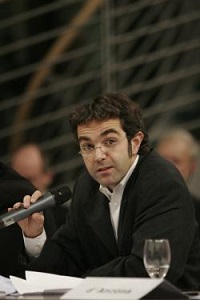
Navid Kermani (Siegen, 27 november 1967)
De Amerikaanse dichter en prozaïst James Agee werd geboren in Knoxville, Tennessee.op 27 november 1909. Zie ook alle tags voor James Agee op dit blog.
Uit: A Death in the Family
“Finally she stopped at a corner to wait for a streetcar, turning her back to him, and pretending he wasn't even there, and after trying to get her attention for a while, and not succeeding, he looked out at the audience, shrugged his shoulders, and acted as if she wasn't there. But after tapping his foot for a little, pretending he didn't care, he became interested again, and with a charming smile, tipped his derby; but she only stiffened, and tossed her head again, and everybody laughed. Then he walked back and forth behind her, looking at her and squatting a little while he walked very quietly, and everybody laughed again; then he flicked hold of the straight end of his cane and, with the crooked end, hooked up her skirt to the knee, in exactly the way that disgusted Mama, looking very eagerly at her legs, and everybody laughed loudly; but she pretended she had not noticed. Then he twirled his cane and suddenly squatted, bending the cane and hitching up his pants, and again hooked up her skirt so that you could see the panties she wore, ruffled almost like the edges of curtains, and everybody whooped with laughter, and she suddenly turned in rage and gave him a shove in the chest, and he sat down straight-legged, hard enough to hurt, and everybody whooped again; and she walked haughtily away up the street, forgetting about the streetcar, "mad as a hornet!" as his father exclaimed in delight; and there was Charlie, flat on his bottom on the sidewalk, and the way he looked, kind of sickly and disgusted, you could see that he suddenly remembered those eggs, and suddenly you remembered them too. The way his face looked, with the lip wrinkled off the teeth and the sickly little smile, it made you feel just the way those broken eggs must feel against your seat, as queer and awful as that time in the white pekay suit, when it ran down out of the pants-legs and showed all over your stockings and you had to walk home that way with people looking; and Rufus' father nearly tore his head off laughing and so did everybody else, and Rufus was sorry for Charlie, having been so recently in a similar predicament, but the contagion of laughter was too much for him, and he laughed too.”
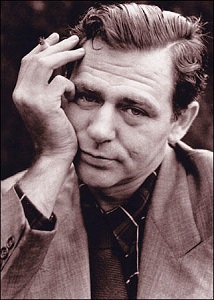
James Agee (27 november 1909 - 16 mei 1955)
De Canadese dichteres en schrijfster Nicole Brossard werd geboren op 27 november 1943 in Montreal (Quebec). Zie ook alle tags voor Nicole Brossard op dit blog.
Uit: Soft Link 3
“It’s names of places, cities, climates that haunt. Characters. Clear mornings, a fine rain that falls all day, rare images from elsewhere and America, two natural disasters that make us close ranks amid corpses, it’s quiet or violet acts, mortars, ice cubes in glasses at cocktail hour, noise of dishes or a slight stutter that momentarily torments, a slap, kiss, it’s names of cities like Venice or Reading, Tongue and Pueblo, names of characters Fabrice Laure or Emma. Words honed over years and novels, words we spoke with halting breath laughing spitting sucking an olive, verbs we add to the pleasure of lips, to success, to sure death. It’s words like cheek or knee and still others further than we can see that leave us teetering on the edge of the abyss, to stretch like cats in morning it’s words that keep us up till dawn or make us flag down a cab on a weekday night when the city’s asleep before midnight and solitude is caught like an abscess in the jaw. It’s words spoken from memory, in envy or pride often words uttered with love while layhing our hands behind the head or pouring a glass of port.”
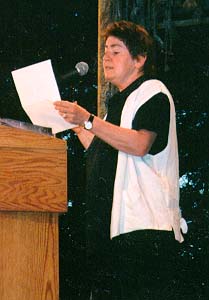
Nicole Brossard (Montreal, 27 november 1943)
De Franse schrijver Philippe Delerm werd geboren op 27 november 1950 in Auvers-sur-Oise. Zie ook alle tags voor Philippe Delerm op dit blog.
Uit: Ma grand-mère avait les mêmes
“V‘là l ‘bord d ‘la nuit qui vient.
Celle-là, c’est la marque d’une seule personne. Une belle personne. Madame Hermier était l’épicière. Elle est morte depuis quinze ans au moins. C’est elle qui régentait le quartier, avec, sous son apparence revêche, un sens de l’équité sans concession. Première rencontre un jour de panne d’électricité :
-Mon pauv’ monsieur, j’veux bien vous vendre trois bougies, mais pas la boîte. Il en faut pour tout le quartier.
Au fil des ans, elle était devenue une amie, venait à la maison partager la galette des rois, bavardait un peu, et disait tout à coup :
-J’vais renter. V’là l’bord d’la nuit qui vient.
Des mots entendus, des mots qu’elle inventait ? Peu importe. Les mots de Madame Hermier. J’aime les soirs précoces à cause d’elle, la sagesse solitaire de ses dimanches d’hiver. Rien ni personne ne l’attendait, mais il fallait rentrer avant la nuit. Peut-être une manière de ne pas vouloir nous importuner trop longtemps, de couper court à nos mais vous avez le temps. Comment la retenir, puisque le bord de la nuit venait ?
Le bord de la nuit. La nuit devient une matière, un tissu, les heures s’installent et nous mettent un manteau. Nos mouvements doivent suivre, s’envelopper dans cette amplitude du ciel, marcher à l’amble. Madame Hermier ne redoutait guère les deux cents mètres nocturnes de trottoir qui l’eussent ramenée chez elle sous les réverbères. Mais c’était aussi une politesse de suivre le rythme du jour. Jehan Rictus appelait le crépuscule « le furtif ». Voilà. Madame Hermier voulait rentrer à la lisière du furtif.“
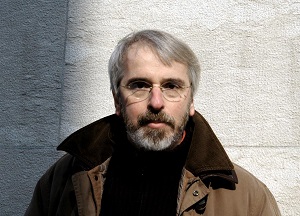
Philippe Delerm (Auvers-sur-Oise, 27 november 1950)
De Canadese dichter, schrijver, essayist en filmmaker Jacques Godbout werd geboren op 27 november 1933 in Montreal, Quebec. Zie ook alle tags voor Jacques Godbout op dit blog en ook mijn blog van 27 november 2010.
Uit: Operation Rimbaud (Vertaald door Patricia Claxton)
“I joined the Jesuits, I studied theology and other futilities. Ignatius of Loyola provides the rule and the uniform, and we of the rank and file provide the conceit and ambition. I am a summa cum laude graduate of one of the universities of our Intelligence Branch, in Chicago. It should be understood that, while the Company works closely with people in Intelligence (as it's called in English), the Superior General of the Jesuits, who is in Rome, should not bear the brunt of blame for the escapades of some of his soldiers. I must stress that all Jesuit fathers are not spies just because they belong to an international congregation; the problem is the Company's penchant for secrecy of the kind cultivated by secret services. You never know whether this chemistry professor at our college in Tokyo, or that Latin teacher in Timbuktu, is working for the greater glory of God or the greater power of the West. These divided loyalties do add spice to the vocation. It's a simple matter: true Jesuits wear hair shirts to conquer their perverse impulses, and false Jesuits use their black robes to hide their lusts — which makes them all the worse, Papa would have said. When I left university at the age of twenty-four, I took my mercenary vows: poverty, chastity, mendacity. They started me off with some delicate little jobs in Greece, where our archaeologists were being watched too closely by the authorities, then in Singapore, where the government was jeopardizing our imports of Cuban tobacco. I loved travelling, interminable meals taken in the company of aging fathers, theological problems raised by science, philosophical discussions, the practice of mental restriction, and the charm of mature women attracted by my cassock. An exquisite routine until this mission, which, for all my efforts, as I have said, has taken a turn as corrosive as sulphuric acid. Wealth, allurement, rebellion ...”
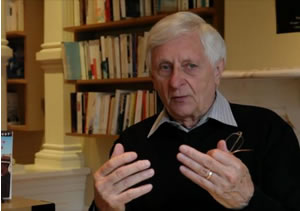
Jacques Godbout (Montreal, 27 november 1933)
De Nederlandse schrijver, priester en archivaris Joannes Josephus (Jozef) Habets werd geboren in Oirsbeek op 27 november 1829. Zie ook alle tags voor Jos. Habets op dit blog en ook mijn blog van 27 november 2010.
Uit: Jacobus van den Borgh
“Op dit voorouderlijk kasteel werd geboren Gerard Petersen van den Borgh, een tresselijk katholiek en zeer godvruchtig man, die ter oorzake dezer verwoesting naar Amsterdam is vertrokken, alwaar hij in huwelijk trad met Anna Janssen de Boys, eene jonge dochter van eerlijke afkomst, bijzondere godsvrucht en groote mildadigheid jegens den armen en behoeftigen man. Uit dit voortreffelijk en goedaardig paar werd omstreeks het jaar 1560, te Amsterdam in hun huis en erf genaamd ‘Den Orgel’ Jacobus Van den Borgh geboren.
Na zijne voorbereidende studiën te Amsterdam voltrokken te hebben, bezocht hij op aanraden van zijn bloedverwant en stadgenoot, Dr Joannes Jansonius, president van het Pauscollegie
te Leuven, deze wijdberoemde universiteit. Hij verwierf er den graad van Licentiaat in de Godgeleerdheid en werd in 1585 priester gewijd. Na achtervolgens de ambten van pastoor te Linden, pastoor van het begijnhof te Leuven en deken van dat distrikt bekleed te hebben, verwierf hij den doctoralen hoed en werd in 1605 in de plaats van Jan Clarius, tot professor en president van het groot collegie der Theologie benoemd.
Hij werd eindelijk in 1611 in de domkerk van Mechelen tot de bisschoppelijke waardigheid verheven, en nam den 19 Mei van hetzelfde jaar, zijnen bisschoppelijken zetel van Roermond plegtig in bezit.”
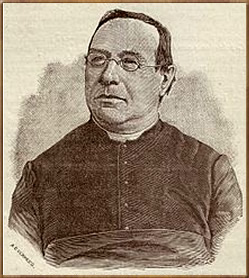
Jos. Habets (27 november 1829 - 22 juni 1893)
Zie voor nog meer schrijvers van de 27e November ook mijn blog van 27 november 2011 deel 1 en eveneens deel 2.
|



